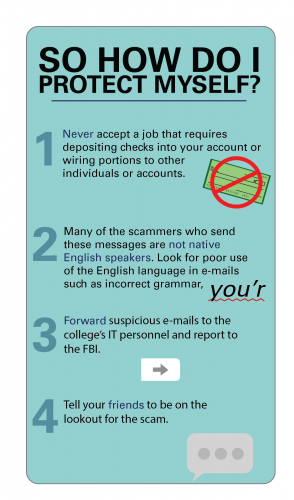College students are being targeted by employment scams across the country, according to a recent public service announcement from the Federal Bureau of Investigations (FBI). The scams, which have become prevalent recently, are posted on popular job websites for college students or are sent directly to students’ emails.
The consequences of cashing these checks could include a student’s bank account being closed and payment fees to the bank.
This is not the first employment scam of this nature. Last year, a similar scam was reported by ABC.
 The fake jobs promise students administrative level positions. Then the employee receives counterfeit checks in the mail or via e-mail and is instructed to deposit the checks into their personal checking account, the FBI said in their PSA. Students are then “directed to withdraw the funds from their checking account and send the money to a ‘vendor,’ purportedly for equipment, materials, or software necessary for the job.”
The fake jobs promise students administrative level positions. Then the employee receives counterfeit checks in the mail or via e-mail and is instructed to deposit the checks into their personal checking account, the FBI said in their PSA. Students are then “directed to withdraw the funds from their checking account and send the money to a ‘vendor,’ purportedly for equipment, materials, or software necessary for the job.”
Though the FBI did not state sites that students should be wary of, but many students, while searching for jobs online, have come across odd postings that are similar to Ponzi or pyramid schemes.
Chris Coseglia, a senior finance major, said that he hasn’t had too many run ins with the types of scams FBI mentions in their statement, but while searching for internships on Handshake, a site for students to find jobs, internships and other career-related things, he did say that he came across some postings that seemed legitimate, but then required him to market to his “personal network,” and encourage them to buy products and join the company.
“A lot of people, especially our age, are vulnerable to these types of scams because we’re all kind of desperate to get jobs,” Coseglia said. “I think we just have to be careful.”
When hearing about the scams Coseglia said that it made him anxious but he knows to be cautious given the cyber scams that have happened in recent months.
“It makes me pretty nervous to hear about it,” Coseglia said. “I’m always nervous when (applying to jobs online) because you have to give out a lot of information right away. I think you have to have trust issues when applying nowadays. Everyone should be cautious.”
Mia Voehringer, a junior, had similar experiences to Coseglia. She also didn’t know about the FBI’s statement, but said that she wasn’t shocked.
“I (hadn’t heard), but I would definitely be more wary when looking for jobs,” Voehringer said. “I’m not shocked (that this is happening), and I hope that the school lets us know about it.”
The FBI provided tips for students and their universities when dealing with these potentialscams.Students were warned to never accept a job that requires them to deposit money into their accounts. The organization also said any suspicious emails or postings should be reported to the university’s IT department, as well as to the FBI.

